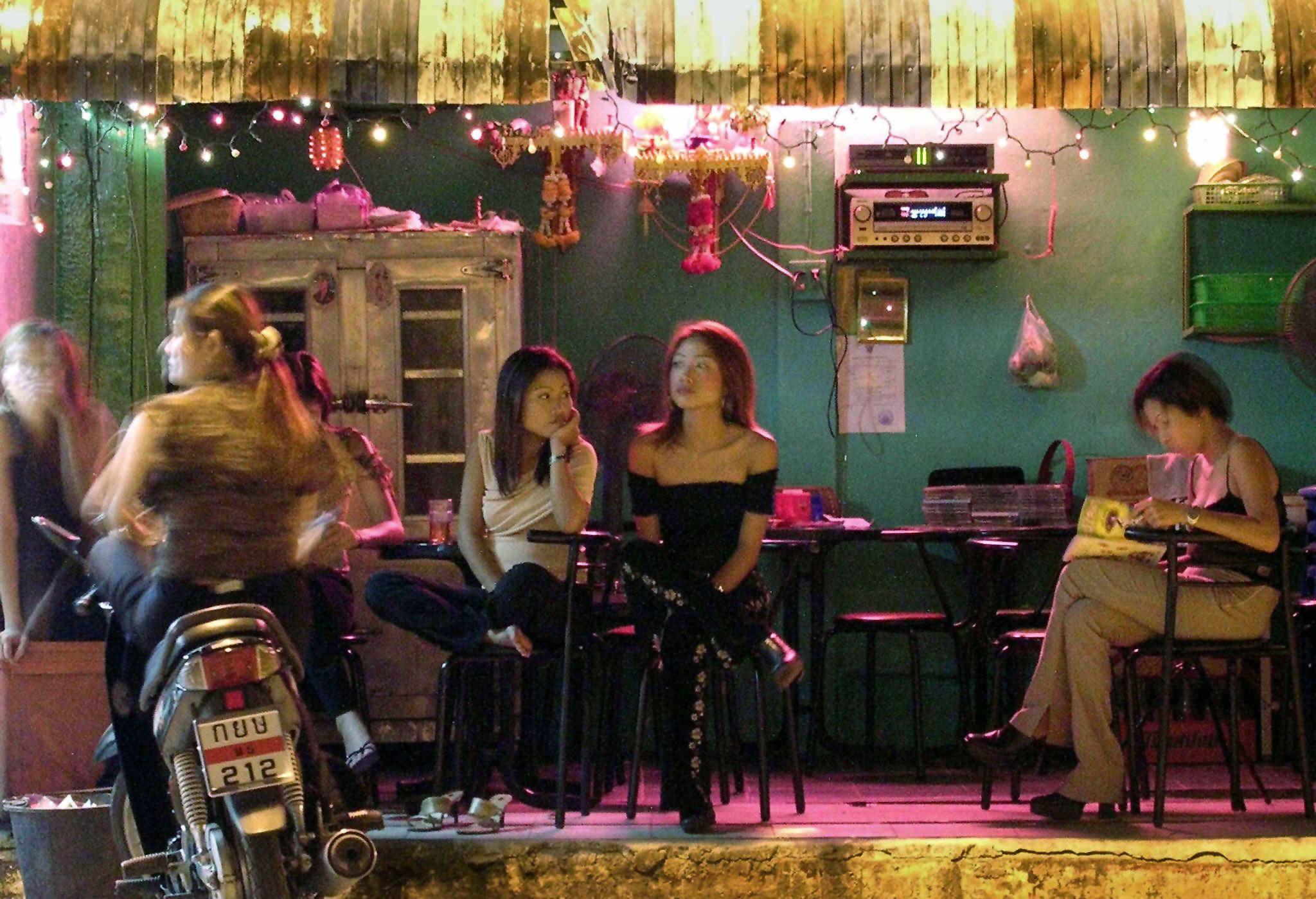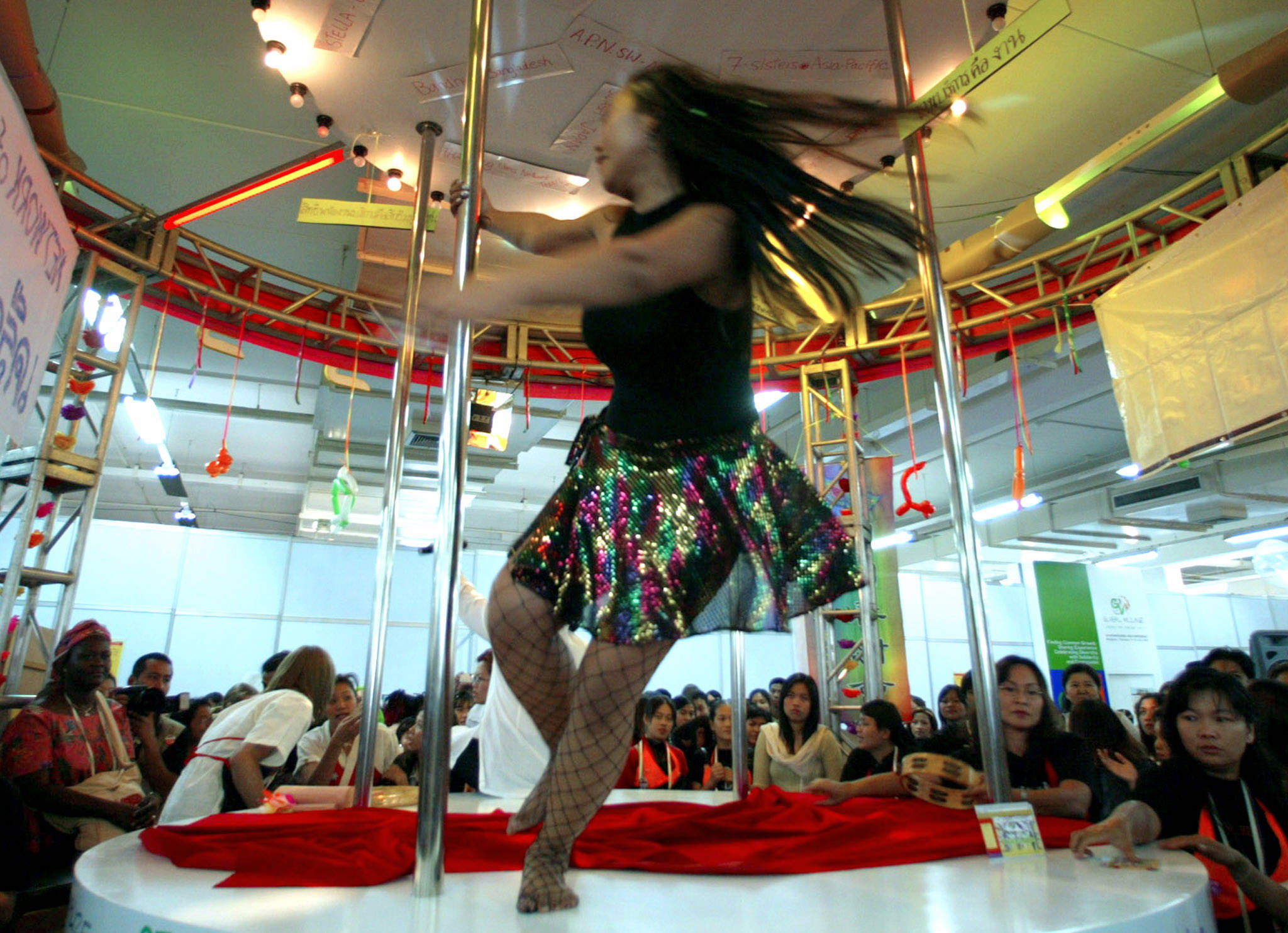Just before 6 p.m., Natchuda “Lily” Chattrawadee kissed her 2-year-old child goodnight, left some instructions to her flatmate, who babysits the toddler most evenings, and took off for another work night at a local red-light club.
A few hours later, Lily returned home bent double in pain. A client had struck her, but she didn’t see going to the hospital as an option.
“That night, the client hit me so hard that I was not sure I would survive,” she said. “But I couldn’t go to the hospital or the doctors would have reported me to the police. I had a young child at home, I couldn’t risk it.”
That was neither the first nor the last time that a client abused Lily during work hours. But like many other sex workers, she has never reported such abuse to the police, fearing arrest.
Although sex work in Thailand is a major economic sector for the country, since the 1960 law against prostitution, it is illegal and criminally prosecutable with prison sentences of up to 20 years. Sex workers have no legal protection and they are not granted labour rights.
However, current political jostling to secure public victories before the national elections on 7 May could mark the beginning of a new era for the sex industry in Thailand. A new draft law to decriminalise prostitution is in the making and, if passed, sex workers will be granted fundamental labour rights, healthcare support and social security.
A coalition of these workers aligned with non-profit organisations, sexual health clinics and LGBTQ+ activists have been calling for the decriminalisation of sex work for several years.
However, it wasn’t until November that the opposition Move Forward Party submitted a first draft proposal to the Ministry of Social Development and Human Security asking for the legalisation of sex work to ensure higher standards of safety for those who work in the sector.
The move stirred interest in the parliament and led the ministry to establish a drafting committee led by a legal team from Thammasat University.
The legal team is now working on a comprehensive draft law to decriminalise sex work in Thailand, aimed at addressing concerns and objectives of opposition parties, women’s rights organisations, LGBTQ+ groups and sex worker organisations.
“We need more protection,” Lily said. “If our job was legal, we could at least safely go to the hospital or report the violence we constantly experience to the police.”
Non-profit organisation Empower Foundation, a leading group for the support and education of sex workers in Thailand, pioneered the advocacy movement.
“The majority of sex workers are women, mostly mothers who work hard to build the dreams of their families and to end generational poverty,” said Empower Foundation coordinator Thanta Laovilawayakul. “The removal of criminal punishments will open the space in society for sex workers to work safely, assert their rights and live with dignity.”
Tunyawaj Kamolwongwat, a member of the party and the sweeping House committee on youth, women, the elderly, ethnic minorities and LGBTQ+ people, was also among the leading figures driving for new legislation. He gathered more than 1,000 signatures for such a bill and brought the proposal before the parliament.
“If one person stirs up the waters, everybody else follows. Like a snowball,” he said.

Thailand has long been a sex tourism hub, grossing millions of dollars every year. But because most of this market operates illegally and unregulated, a precise estimate of the real income from the sex work industry in Thailand is impossible to define.
But with an estimate of 100,000 to 400,000 sex workers operating across the country, according to local and international news reports across in the past two decades, the approximate income from the industry could reach up to several billion dollars.
By decriminalising the activity, such revenue will contribute to the national economy as with any other labour sector. Advocates of reform say that would allow the government to have a clearer grasp on the financial exchanges happening in the sex industry – as well as advancing the fights against corruption and human trafficking, which have been primary concerns about the industry for decades.
The 1960 law that criminalised sex work was later replaced by the 1996 Prostitution Suppression Act. This attempted to steer workers out of the industry with the creation of rehabilitation institutions, where those convicted of prostitution would undergo mental and physical health check-ups and access occupational training and other programmes.
Despite the amendments, the industry remained illegal.
Thailand prohibits prostitution as well as the advertisement for the procurement of sex workers. Section 286 of the Thai Criminal Code punishes prostitution with a jail sentence of seven to 20 years, but the implementation of this section has been rarely applied in court given the well-known huge dimensions of the underground sex industry in Thailand.
While technically these charges are rarely exercised, they still exist, hanging over the lives of those who work in the sector.
Since the criminalisation of prostitution, several types of entertainment businesses have been turning from traditional massage parlours, bathhouses and bars to hidden brothels. But although the owners of such businesses are criminally liable under the prostitution suppression law, they usually get away with their crimes by paying “protection fees” to local authorities, local non-profit law-monitoring organisation iLaw reported.
While there remain plenty of laws that carry punishments for sex work and related activities, no legal framework addresses the health and social safety for these workers in Thailand.

Stigma and religious beliefs are some of the key factors behind violence and abuse against sex workers. This has detrimental effects on their mental and physical health as well as the high risks of falling into the trap of drug and alcohol abuse, according to a review article published by Biomedical Sciences and Clinical Medicine in 2022.
“I am constantly worried about this [the risk of violence],” Lily said. “Even when I am home, with my child, I fear that some of the clients or the police followed me.”
Hopes are that by legalising the industry, sex workers could fight for their own rights and find protection in the law regardless of the deeply-rooted stigma against them, according to Tunyawaj.
“The stigma comes from a patriarchal culture and religion. No laws can reduce or remove the stigma if society doesn’t change,” he said. “We have to empower sex workers so they can fight the stigma themselves.”
Although Tunyawaj argued a law might not eradicate this perspective right away, a change in the legal regulation of the industry could be the first step towards a more dignified lifestyle for sex workers.

With decriminalisation, sex work would remain illegal, but it would be punished only under civil or administrative laws rather than criminal law. On the other hand, legalisation means the removal of all penalties and the full regulation of the sex work market. Penalties might apply only when said regulations are violated.
Discussions on the possibility of regulating sex work in Thailand have been ongoing since mid-2022. But while the original idea was to legalise sex work, Thanta said the new draft aims at its decriminalisation instead.
”Empower aims at decriminalising sex work as opposed to legalising it, which would require compulsory registration, as well as other unhelpful and harmful regulations that sex workers in countries like Germany, the Netherlands and Singapore are fighting against,” Thanta said.
Sex workers and their employers currently pay much more in bribes to corrupt officials than they would ever pay in income tax, Thanta believed.
“Sex workers will be happy to pay income tax the same as other workers, especially to contribute to State Welfare,” she said.
Data provided by Empower Foundation show that 80% of sex workers in Thailand are single mothers as Lily is, who support other adults in the family. The average age of women is 26 years old, and the majority of them have been living in poverty for most of their lives.
“Thai society is more worried by the levels of corruption and the human rights of sex workers rather than outdated ideas of morality,” Thanta said. “Accepting decriminalisation of sex work does not mean accepting sex work, yet it doesn’t have to be punished with criminal charges.“
As the drafting team is working on a unified definition of sex work, Tunyawaj reported that one of their objectives is to delineate safe spaces for sex work activities and related advertisements to protect children from being unintentionally exposed to inappropriate content on the internet, television or in public areas. He mentioned the premises of selected entertainment spots such as clubs and discotheques as potential spaces to run sex work activities freely and safely.
But regulations might not be the most suitable solution for all sex workers, according to Lily. For some of her colleagues, the legal determination of selected sex-work locations would mean a huge decrease in work opportunities.
“We often meet clients in hotels, restaurants, or on the beach, if you live there,” Lily said. “But if the law passes, we would be able to only work in registered business venues.”
Also, while in the original draft official registration was required for all sex workers, the new text would only require the registration of businesses hiring sex workers.
“Instead of being treated as mafia bosses and outlaws who are not expected to observe worker’s rights, business owners will be treated as employers who are obliged to follow labour codes, social security enrollment and occupational health and safety,” Thanta said.
The fate of the ongoing proposal may still be unclear, but its progress so far could signal a real institutional willingness to change the status quo for Thailand’s sex workers.
While waiting for the final draft proposal to be finalised and submitted for parliament review, the coalition driving the bill is prepared to step forward with another campaign if parliament rejects this one, Tunyawaj explained.
“We won’t stop here,” he said. “We will continue to bring this up in parliament until we see a real change.”


